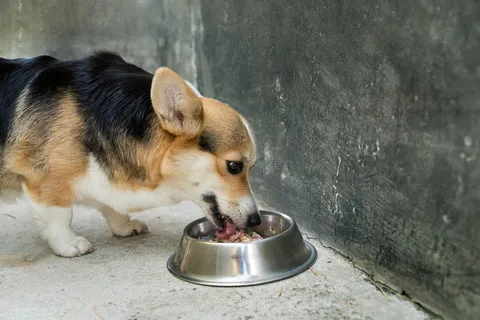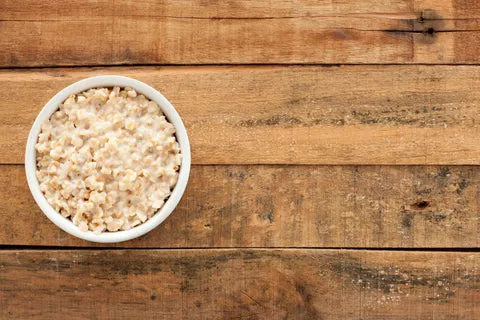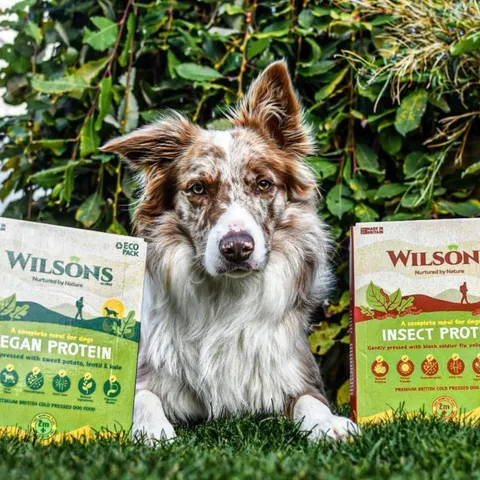When our beloved canine companions aren’t feeling their best, it can be incredibly worrying, especially if they lose their appetite or experience an upset stomach. Just like humans, dogs often go off their regular food when they’re under the weather. However, providing them with the right nutrition during illness is crucial for boosting their energy levels, supporting their immune system, and speeding up their recovery. Knowing What Can Dogs Eat When Sick can make a significant difference in their comfort and healing process.
This guide from Dog Care Story aims to provide clear, actionable advice on ideal food choices for sick dogs, focusing on easily digestible and nutrient-rich options. We’ll also touch upon foods to avoid and considerations for dogs with chronic sensitivities or allergies. Remember, while this guide offers helpful information, always consult your veterinarian for personalized advice, especially if your dog’s condition worsens or doesn’t improve. Providing safe foods for dogs and understanding what is good for dogs to eat is key to their overall health, but even more so when they are unwell.
Understanding Your Dog’s Illness: When to Consult a Vet
Before adjusting your dog’s diet, it’s important to assess their symptoms. While a mild upset stomach might respond well to a bland diet, persistent vomiting, severe diarrhea, lethargy, fever, or any significant change in behavior warrants immediate veterinary attention. Your vet can diagnose the underlying issue and recommend the most appropriate course of treatment, which may include specific dietary modifications or medication. Never hesitate to seek professional advice if you are concerned about your dog’s health.
Safe & Soothing Foods for Sick Dogs (The Bland Diet)
When your dog has an upset stomach, a plain, bland diet is typically the best approach. These foods are easy to digest and gentle on their system, helping to soothe their digestive tract without overwhelming it. It’s wise to have some of these healthy, nutritious options on hand for unexpected illnesses. Here are ten of the best, most nutritious options to feed a dog with an upset stomach:
1. Boiled White Meat (Chicken or Turkey)
 A close-up of a person's hand holding a piece of boiled chicken breast, perfect for a sick dog's bland diet.
A close-up of a person's hand holding a piece of boiled chicken breast, perfect for a sick dog's bland diet.
Plain white meat, such as chicken or turkey breast, is an excellent choice for a sick dog. It provides lean protein that is easy to digest and low in fat, helping to soothe your dog’s stomach. Always remember to remove any skin or bones before feeding, as these can pose a choking hazard or irritate the digestive system.
How to prepare:
- Rinse the meat thoroughly under cold water.
- Remove any excess fat, skin, or bones.
- Place the meat in a pot, cover it with water, and bring it to a boil.
- Reduce the heat and let it simmer for 15-20 minutes until thoroughly cooked.
- Drain the water and shred or cut the meat into small, bite-sized pieces for easier digestion.
- Allow it to cool completely before serving, either alone or with a small amount of white rice or cooked vegetables.
2. Plain White Rice
White rice is a staple ingredient in many bland diets for sick dogs. While brown rice is more nutritious for healthy dogs, the blandness and lower fiber content of white rice make it easier to digest for an upset stomach. It also helps to bind loose stools, which can be beneficial if your dog has diarrhea.
 A golden retriever dog gazes at a bowl filled with plain white rice, a common and easily digestible food for dogs with an upset stomach.
A golden retriever dog gazes at a bowl filled with plain white rice, a common and easily digestible food for dogs with an upset stomach.
How to prepare:
- Rinse the rice under cold water.
- Add the rice to a large pot with two parts water to one part rice. A generous pinch of salt can be added, but avoid excessive amounts.
- Bring to a boil, then reduce heat to a simmer, cover, and cook on low heat for about 18 minutes, or until all the water is absorbed.
- Allow it to rest and cool, then fluff with a fork before serving.
3. Sweet Potatoes
Plain, cooked sweet potatoes are rich in vitamins, especially Vitamin A, and fiber. They are incredibly gentle on the stomach and an excellent choice for soothing your dog’s digestive system. They also provide essential calcium, iron, and magnesium, contributing to overall health.
 Several slices of cooked sweet potato arranged on a wooden table, highlighting a healthy and easily digestible option for sick dogs.
Several slices of cooked sweet potato arranged on a wooden table, highlighting a healthy and easily digestible option for sick dogs.
Caution: Never feed raw sweet potatoes, as they are harder to digest and can worsen an upset stomach.
How to prepare:
- Peel the skins and chop the sweet potatoes into chunks.
- Add them to a pot of boiling water and boil until soft.
- Drain the water and mash them thoroughly.
- Let them cool before serving.
4. Pumpkin
Pumpkin is renowned for its effectiveness in settling an upset stomach and improving a sick dog’s well-being. It’s rich in vitamins that boost the immune system and packed with fiber, which helps regulate digestion, whether your dog is experiencing diarrhea or constipation.
 A Siberian Husky dog appears to smile with a slice of pumpkin placed across its snout, showcasing a dog-friendly and digestive-aid food.
A Siberian Husky dog appears to smile with a slice of pumpkin placed across its snout, showcasing a dog-friendly and digestive-aid food.
Important: Use plain canned pumpkin (100% pumpkin puree) or fresh cooked pumpkin. Avoid pumpkin pie filling, which contains added sugars, spices, and other ingredients that can harm your dog’s stomach. Give your dog up to four tablespoons mixed with their bland meal.
5. Homemade Bone Broth
Bone broth is a fantastic hydrator and source of essential nutrients and minerals like sodium and potassium, especially for dogs who may be dehydrated or have lost electrolytes due to illness. Its low carbohydrate content and gentle nature make it easy to digest for dogs with upset stomachs.
 A small, light-colored puppy gently licks a bowl, enjoying homemade bone broth, known for its hydrating and nutrient-rich properties for sick dogs.
A small, light-colored puppy gently licks a bowl, enjoying homemade bone broth, known for its hydrating and nutrient-rich properties for sick dogs.
Caution: Avoid using garlic or excessive salt during preparation, as these can be toxic or further upset your dog’s stomach.
How to prepare:
- Add beef, pork marrow bones, and/or chicken or turkey bones to a large cooking pot.
- Cover the bones with a few inches of water.
- Cook on low heat for 20-24 hours.
- Once finished, strain the liquid to remove all bones and solid pieces.
- Serve the cooled liquid alone or mixed with other bland foods.
6. Baby Food
For puppies or small dogs struggling with their appetite or stomach issues, stage 2 meat-based baby foods (e.g., chicken, lamb, turkey) can be an effective feeding choice. It’s easy to chew and digest, making it suitable for treating an upset stomach or diarrhea.
 Several young doodle puppies happily eat from a shared plate of baby food, demonstrating an easy-to-digest option for unwell or weaning puppies.
Several young doodle puppies happily eat from a shared plate of baby food, demonstrating an easy-to-digest option for unwell or weaning puppies.
Critical: Carefully check the ingredients list to ensure there are no additives or ingredients toxic to dogs, such as onion powder or garlic. Always consult your vet if you are unsure about the safety of certain baby food ingredients.
7. Poached Fish
Fish is an excellent source of healthy fats (like Omega-3s) and vitamins, which can significantly benefit your dog’s health and immune system, especially when they’re recovering from an illness. The strong aroma of fish can also stimulate a reluctant appetite.
 A fluffy Corgi dog happily eats from its food bowl, enjoying a meal that might include poached fish, a nutritious option for dogs.
A fluffy Corgi dog happily eats from its food bowl, enjoying a meal that might include poached fish, a nutritious option for dogs.
How to prepare:
- The best way to prepare fish for your dog is to poach it.
- Place the fish (e.g., cod, salmon, white fish) in a pan of water.
- Bring it to a boil, then reduce the heat and simmer for 10-15 minutes until fully cooked.
- Carefully remove all bones and skin, then flake the fish into small pieces before feeding it to your dog.
8. Plain Oatmeal
Plain, cooked oatmeal, made from rolled oats, can help soothe an upset canine stomach. It’s high in soluble fiber, which can aid with constipation and contains antioxidants that may help reduce stomach inflammation.
 A rustic image of a bowl of plain, cooked oatmeal on a wooden table, emphasizing a healthy and soothing food choice for dogs with digestive issues.
A rustic image of a bowl of plain, cooked oatmeal on a wooden table, emphasizing a healthy and soothing food choice for dogs with digestive issues.
Important: Feed oatmeal sparingly. While beneficial, too much fiber can worsen stomach issues. Ensure it’s plain oatmeal, cooked with water, and without any added sugar, milk, or flavorings.
9. Plain Yogurt
Plain, unsweetened yogurt, especially varieties rich in live active cultures (probiotics), can be beneficial for a dog with an upset stomach. Probiotics aid in digestion and support gut health, helping to rebalance the gut flora. If your dog has constipation, plain yogurt can help regulate their digestive system.
 A cute puppy with a small amount of plain yogurt on its beard, illustrating a dog-friendly treat that can aid digestion.
A cute puppy with a small amount of plain yogurt on its beard, illustrating a dog-friendly treat that can aid digestion.
Plain, natural yogurt is readily available. Ensure it contains no xylitol, an artificial sweetener that is highly toxic to dogs. It can be served as is or even frozen as a cool treat.
10. Cooked Eggs
As long as your dog isn’t actively vomiting, cooked eggs are an ideal food choice. They are gentle on the stomach and provide a good source of protein, which is vital for recovery. Eggs are also an excellent energy booster if your dog feels lethargic after an illness.
 A dog attentively eating a meal from its bowl, which appears to contain scrambled eggs and vegetables, offering a protein-rich and gentle food option.
A dog attentively eating a meal from its bowl, which appears to contain scrambled eggs and vegetables, offering a protein-rich and gentle food option.
How to prepare:
- Scrambled without butter or oil, or boiled, are the best ways to cook eggs for your dog to ensure they are gentle on its stomach.
- If your dog is vomiting, avoid eggs completely, as the fat content, even minimal, might be too much.
Feeding Guidelines for a Sick Dog
When introducing new foods to a sick dog, especially after a period of not eating, it’s crucial to do so cautiously:
- Small, Frequent Meals: Start with very small portions (e.g., a tablespoon or two, depending on your dog’s size) every few hours. This prevents overwhelming their digestive system.
- Hydration: Ensure your dog always has access to fresh water. If they aren’t drinking, offer ice chips or diluted bone broth. Dehydration can quickly worsen an illness.
- Monitor Symptoms: Closely observe your dog’s reaction to the food. If vomiting or diarrhea recurs or worsens, stop feeding and contact your vet immediately.
- Gradual Reintroduction: Once your dog’s symptoms improve for 24-48 hours, gradually reintroduce their regular dog food over several days. Mix increasing amounts of their regular food with the bland diet until they are fully back on their normal regimen.
Remember, what you shouldn’t feed your dog is just as important as what you should, especially when they are vulnerable. Fatty foods, spicy ingredients, human food scraps, and anything not specifically approved by your vet should be avoided. For a comprehensive overview of foods that are unsafe, you can refer to our list of what dogs can’t eat and detailed insights on what you shouldn’t feed your dog.
Dietary Considerations for Dogs with Chronic Sensitivities or Allergies
If your dog frequently suffers from an upset stomach or recurrent illness, it may be due to food-related allergies or chronic sensitivities. Consulting your vet to determine the cause is essential. For dogs with sensitive tummies, certain specialized diets can make a significant difference.
Cold Pressed Dog Food
Cold pressed dog food is a type of dry food that undergoes minimal processing at a much lower temperature than traditional kibble. This gentle manufacturing process helps retain more of the raw ingredients’ nutritional value. Because of its unique production, cold pressed food breaks down easily in the stomach, making it ideal for sensitive digestive systems. It supports overall gut health and can be fed alongside a raw diet. Many varieties offer excellent nutrition without the common irritants found in highly processed foods.
Insect Protein Dog Food
For dogs with severe meat-related allergies or sensitivities, insect protein dog food offers a hypoallergenic and highly digestible alternative. Complete and nutritionally balanced, this type of food retains its nutritional value due to similar cold-pressing or gentle processing methods. Insects can provide more protein than traditional meat sources like chicken or beef, ensuring your dog doesn’t miss out on essential nutrients. They are also naturally low in purines, making them suitable for dogs with specific health concerns.
 A Border Collie dog standing beside a bowl of insect protein dog food, showcasing a hypoallergenic and sustainable dietary option for canines with sensitivities.
A Border Collie dog standing beside a bowl of insect protein dog food, showcasing a hypoallergenic and sustainable dietary option for canines with sensitivities.
Raw Frozen Dog Food
Raw food diets are often chosen for dogs with sensitivities due to their minimally processed, natural ingredients. Typically grain-free, raw food can significantly aid digestion and improve overall health, including coat and skin condition. Raw frozen dog food often comes in balanced mixes of meat, offal, and bone, sometimes with added vitamins and minerals, allowing pet parents to tailor the diet to their dog’s specific needs and allergies. Before transitioning to a raw diet, it’s always recommended to consult your veterinarian to ensure it’s appropriate for your dog’s health status.
 A small dog, possibly a Dougal, eagerly eating a mix of raw and cold-pressed food from its bowl, representing a natural and potentially beneficial diet for sensitive dogs.
A small dog, possibly a Dougal, eagerly eating a mix of raw and cold-pressed food from its bowl, representing a natural and potentially beneficial diet for sensitive dogs.
Conclusion
Caring for a sick dog requires patience, attentiveness, and accurate information about their dietary needs. Knowing what can dogs eat when sick provides you with essential tools to support their recovery. A bland, easily digestible diet featuring options like boiled chicken, white rice, pumpkin, and bone broth can often help soothe an upset stomach and provide vital nutrients. For dogs with persistent issues or allergies, exploring specialized diets like cold pressed, insect protein, or raw food, always in consultation with your vet, can lead to long-term health improvements.
Always prioritize your dog’s well-being and consult your veterinarian for any serious or prolonged illness. Their professional guidance is invaluable in ensuring your furry friend receives the best possible care. For more advice on canine nutrition and wellness, explore other helpful articles on Dog Care Story, your trusted resource for pet parenting.
References
- Veterinary advice and established pet nutrition guidelines.
- General knowledge on canine digestive health.
